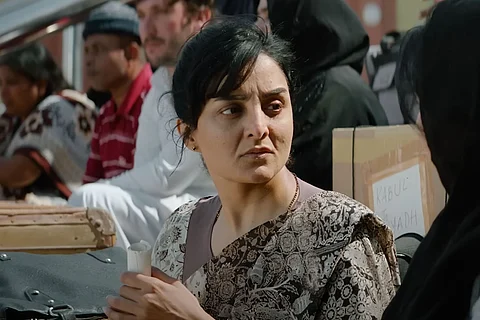

After watching a film, it is usually easy to tell if the experience was fulfilling or not. The best-case scenario is when the film is incredibly good and relevant. The other kind of films is those that are watchable but not exactly necessary i.e., harmless though the world can do without them. Next comes films that are unnecessary and sometimes toxic. Then there are the ones like Ayisha – not so well made, but dealing with themes that must be documented. This is where it gets tricky to pass an opinion about the film.
Debutant director Aamir Pallikkal’s Malayalam-Arabic bilingual film Ayisha, starring Manju Warrier in the titular role, is inspired by the experiences of veteran theatre and screen actor Nilambur Ayisha – often referred to as the first Muslim woman in Kerala to act in plays and films. Written by Ashif Kakkodi and produced by Zakariya Mohamed, the film has a light, feel-good tonality, which makes use of cinematic liberty to accentuate Manju Warrier’s character. The plot focuses on Ayisha’s life as a domestic worker at a royal family residence in Saudi Arabia. Most of the difficult truths from her past are kept brief, emphasising on how well she tries to survive despite them. It is definitely not necessary that a film dwells on the catharsis of a character, even if they have had a turbulent life. But the problem with Ayisha is that it does not impactfully document a personality like Nilambur Ayisha, whose life as the climax observes, is a protest in itself.
Married at 14 and separated soon, Nilambur Ayisha was a single mother who acted in several socially transformative political plays, backed by the Communist Party in Kerala, at a time when men played female characters on stage. She was then forced to leave for Saudi Arabia where she worked as a domestic help for many years, after which she returned to Kerala. In 1953, while 18-year-old Nilambur Ayisha was performing on stage, she was shot at to force her off stage. Though the bullet missed her, she was attacked because it was deemed unacceptable for a Muslim woman to pursue performing arts. This incident is referenced verbally in the film, but it feels like the film’s conscience is more interested in dramatising it rather than delving deep into the life of a woman with an unending love for performing arts, who was constantly haunted by religious conservatism and gender-based violence.
Manju Warrier tries her best to fit into the hefty shoes of Nilambur Ayisha on screen and occasionally succeeds at it, but the narrative suffers from an existential crisis of whether it wants to be a biopic or a comedy-drama. If the intention was to blend both, unfortunately, the balance does not come through uniformly. The dance number ‘Kannilu kannilu’, which is choreographed by Prabhu Deva and went viral when it was released, tries to bring in an element of whimsy that does not take off.
The most memorable sequences in the film are the ones portraying the bond between Ayisha and the ailing matriarch Mama (played by Mona) whose family she serves in Saudi. The visual exploration of Middle-Eastern life is interesting, adding to the intrigue of the narrative. In the moments where Mama and Ayisha exchange solidarity, comfort, and an unsaid understanding of what it means to be women, there is a beautiful parallel between how old age is very much like taking the limelight away from an actor who was relevant until then. But after a while, this plotline feels too indulgent, as if the makers were unable to decide on what to do with it in the totality of the film. The film also seems to try too hard to place Manju Warrier’s character as a beacon of resilience and strength, a problem that arises when stories on the lives of women are conceived with a deliberate male lens to idealise them, rather than humanising them.
As I mentioned in the beginning, films like Ayisha are tricky to write opinions on. The good moments though present are too scattered to be able to make any cumulative impact. But they are important stories because the people they reference are those whose lives must be documented. For Nilambur Ayisha, for the life she lived, for her towering spirit, and the art she withstood several kinds of abuse for, this Manju Warrier starrer deserves our time, though Ayisha’s life deserves a much more fitting silver screen tribute.